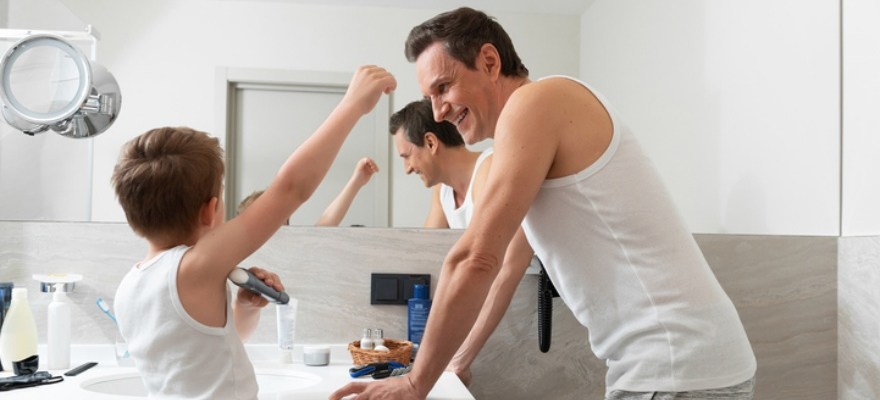
How to Talk About Hygiene With Your Kids
Body odor, smelly shoes, and cavities, oh my!
As children grow up they go through many body changes, mostly associated with puberty, that can have some unsavory effects on the air quality around them (to put it delicately). It is totally normal! But they might have a lot of questions about those changes, and moreover, they might even be embarrassed about them.
It’s a parents responsibility to educate them on what these changes are, why they are occurring, and how to manage them. Essentially, it’s time to have the hygiene talk.
And when it comes to hygiene, we are talking about it all: body odor, bathing, brushing teeth, etc.
I’ve been a dance teacher for eight years, so I know a thing or two about stinky adolescents. Whether it is musty gym bags or smelly shoes, I have seen and smelled it all! If my nose could write this article, it would. Since it can’t, I sat down with Dr. Vladimir Barayev, a Staten Island Pediatrician and parent of two, to discuss how parents can broach the topic of hygiene with their children; I also heard from some parents of pubescent-age children on their own tried-and-true approaches for instilling good hygiene habits in kids.
When and How to Start Talking to Your Kids About Hygiene
Before even starting the conversation, Dr. Barayev advises parents to introduce good hygiene by modeling it themselves. “The same way that you approach teaching a child any other skill or any other piece of information about the world is by role modeling for them,” he explains.
“I always start out by leading by example and I narrate the activities that I do [like hand-washing]. Narration has been shown to be very important for children to develop speech skills and also to understand what is going on in their environment because they’re just like sponges, soaking everything in.”
It’s also important to educate your child early – and frequently – on the positive outcomes of good personal hygiene. They should be reminded regularly that showering and bathing will make them smell great, brushing teeth will make their teeth shiny, and washing their hands will keep away germs that make them feel sick.
Dr. Barayev stresses the importance of being repetitive. “It’s about the repetition of the message that helps children to establish habits and routines. Over 80% to 90% of the activities that we do are automatic,” he said.
Eltingville mom Jennifer began emphasizing the importance of proper hygiene habits in her two kids at around 8 or 9 years old. “It was easy because they are both athletes, so I used that as a starting point,” she said. Something like, you are practicing more now and getting older, which means you will sweat more, so you need to wear deodorant. Very matter-of-fact and simple. Seemed to work with both of them.”
Annadale mom Karen starting the hygiene discussion later and regrets waiting. “I’m still fighting with my son to shower daily. I think boys are harder than girls,” she said.
One mom I spoke to, Laura, used social media to successfully get her point across to her son, who plays baseball. “It was a challenge to convince him to prioritize hygiene,” she said. “We talked, I bought books, and I even sent him YouTube videos. In the end, it was the TikTok videos that worked the best.”
When Something Seems Off
If you notice your child is not properly bathing or brushing their teeth daily, be as sensitive about it as you can so as not to embarrass them when you bring it up. Choose your words carefully; negative language can affect a child’s self-esteem and close off any possible conversation. Remind them that body odor is something that affects everyone, Dr. Barajev suggests, saying “Body odor is a natural thing. It doesn’t make you a bad person if you have odor. For some children, hygiene doesn’t seem to be a top priority. They’re not as worried about any body odors or not being as clean.”
“But we need to explain to them we have a buildup of bacteria on our bodies over time,” he says, noting it is completely normal if your child is not thrilled to bathe or brush their teeth. “Say to them: If you have a poor odor from your breath or your body, it’s going to distract others from seeing the wonderful person that you are on the inside. You don’t want your greatness to be overshadowed by your odors.”
It’s also absolutely vital to check in with your child and make sure everything is okay with their mental health. Sometimes there may be an underlying issue, like depression or anxiety, that is causing their poor hygiene.
Hygiene Products for Kids
Less is more when it comes to cleaning products, Dr. Barayev explains.“The less additives they have the better it is. The key ingredient in it should be, of course, soap,” he says. “I advise families, if they have a child with dry skin or eczema, for example, to try to stay away from scented products that could make your skin worse. My personal preference is just generally to try to use things with as little added to them as possible.”
As for toothpaste, Dr. Barayev says it needs to have one of two ingredients: fluoride as recommended by the American Medical Association, or hydroxyapatite, an alternative. Both have been shown to reduce the possibility of getting cavities. “I know some products don’t have either hydroxyapatite or fluoride in them, and they call themselves toothpaste,” he says, shaking his head. “In my view, that’s not toothpaste.”
A great way to get your child into better hygiene habits is by including them in picking out products. Let them pick their favorite colors, flavors, and scents so they will be excited to use them.
Check out our top picks for kids’ deodorant and toothpaste brands, as recommended by parents of many formerly-stinky kids!
Best Deodorant for Kids
Tom’s of Maine Natural, “Wicked Cool”
Why we love it: created for kids, 24-hour odor protection
Good For You Girls Roll On
Why we love it: Gentle and plant-based
Native Regular
Why we love it: many scents, environmentally friendly
Dove Teens
Why we love it: specifically designed for teens, 48-hour dermatologist-tested
Teen Spirit Antiperspirant
Why we love it: designed for teens, no white residue remains
Keep it Kind Fresh Kidz Natural Roll On
Why we love it: varying strength, easy application
Best Toothpaste for Kids
Colgate Kids Toothpaste Why we love it: Fluoride and Cavity Protection
Crest Advanced Kids Flouride Toothpaste Why we love it: Fun color changing after two minutes of brushing
Tom’s of Maine Children’s Toothpaste Why we love it: It has Fluoride protection and has a fun fruity flavor
Risewell Kids Why we love it: Made with Hydroxyapatite, a naturally-occurring mineral to protect teeth
Psst.. Check out Expert Tips On Feeding Picky Eaters






